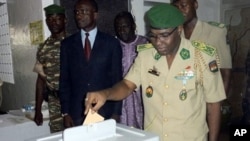Partial results from Sunday's referendum in Niger show overwhelming support for constitutional changes that would lessen the president's power.
With nearly a quarter of the ballots counted, it appears at least 80 percent of Niger's voters voted "yes" on a referendum to change the West African country's constitution.
During Sunday's vote, military leader General Salou Djibo called for Nigeriens to vote for the change in order to usher in a new democratic system.
He said the referendum would lead to a democratic system of political stability. Djibo has served as head of the interim government in Niger since a February coup displaced then-president Mamadou Tandja.
In August of 2009, Tandja pushed through a new constitution for Niger that abolished term limits and increased the president's power. When Niger's parliament and constitutional court said the vote was illegal, he dissolved both bodies and ruled by decree.
The president's refusal to give up power at the end of his second five-year term sparked widespread protests, and after military leaders toppled him, they named a consultative counsel to draft a new constitution . The counsel settled on what is known as a semi-presidential system where the chief executive's powers are limited.
But voter turnout to approve or disapprove this new constitution was low, said one election official, Salif Boubacar.
He says he does not know what the people think or if the referendum was important for them. He says there were a lot of people who came to get their voting cards, but did not vote.
The alliance of political parties that supported former president Tandja says the new constitution's weakening of executive powers is a mistake because Niger needs a strong central authority to manage such a vast, underdeveloped country with huge population growth.
Presidential and legislative elections in Niger are scheduled for January 31.
Initial Results Show Approval of Niger's New Constitution




